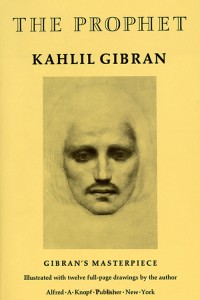On Love Posted by jesa on Nov 8, 2012 in Arabic Language, Culture, Vocabulary
Gibran Khalil Gibran is one of the most recognized poets in the world. He was not only a poet, but also an artist, painter, sculptor (نَحَّات), theologian, and more importantly a prolific writer. He was born on January 6, 1883 in Lebanon and passed away on April 10, 1931 in New York City. Born in the town of Bsharre in Northern Lebanon, he later immigrated (هاجَرَ) with his family to the United States of America. Gibran pursued his liberal arts education in the United States of America , where he specifically studied art and literature (الأدَب). He moved between Boston and New York City, and held his first art exhibition of his drawings and paintings in 1904 in Boston. In the Arab world, Gibran is viewed as a cultural, literary and political rebel (ثائِر). He is renowned for his romantic (رومانسيّ) style, especially in prose poetry. One of his chief works in the Arab world and the English-speaking world is ‘The Prophet’ (النَّبي). It is mainly made of a series of philosophical essays written in poetic English prose. Many do not recognize an important fact that Gibran is the third best selling poet of all time, just behind the famous William Shakespeare and Lao-Tzu.
In this post I would like to share some of my favorite verses from one of Gibran’s most famous poems ‘On Love’ which is found in The Prophet.

When you love you should not say, “God is in my heart,” but rather, “I am in the heart of God.”
أما أنت إذا أحببت فلا تقل: “أن الله في قلبي”, بل قل بالأحرى: “أنا في قلب الله”
And think not you can direct the course of love, for love, if it finds you worthy, directs your course.
ولا يخطر لك البتة أنك تستطيع أن تتسلط على مسالك المحبة, لأن المحبة إن رأت فيك استحقاقاً لنعمتها, تتسلط هي على مسالكك
Love has no other desire but to fulfill itself.
والمحبة لا رغبة لها إلا في أن تكمل نفسها
But if you love and must needs have desires, let these be your desires:
ولكن, إذا أحببت, وكان لا بد من أن تكون لك رغبات خاصة بك, فلتكن هذه رغباتك
To melt and be like a running brook that sings its melody to the night.
أن تذوب وتكون كجدول متدفق يشنف آذان الليل بأنغامه
To know the pain of too much tenderness.
أن تخبر الآلام التي في العطف المتناهي.
To be wounded by your own understanding of love;
أن يجرحك إدراكك الحقيقي للمحبة في حبة قلبك
And to bleed willingly and joyfully.
وأن تنزف دماؤك وأنت راض مغتبط
To wake at dawn with a winged heart and give thanks for another day of loving;
أن تنهض عند الفجر بقلب مجنح خفوق, فتؤدي واجب الشكر ملتمساً يوم محبة آخر
To rest at the noon hour and meditate love’s ecstasy;
أن تستريح عند الظهيرة وتناخي نفسك بوجد المحبة
To return home at eventide with gratitude;
أن تعود إلى منزلك عند المساء شاكراً
And then to sleep with a prayer for the beloved in your heart and a song of praise upon your lips.
فتنام حينئذ والصلاة لأجل من أحببت تتردد في قلبك, وأنشودة الحمد والثناء مرتمسة على شفتيك
I hope you enjoy these beautiful words as you reflect on the beauty of loving and being loved in a world that is at some times engulfed in hatred, chaos and turmoil.

Build vocabulary, practice pronunciation, and more with Transparent Language Online. Available anytime, anywhere, on any device.
About the Author: jesa
Salam everyone! Born as an American to two originally Arab parents, I have been raised and have spent most of my life in Beirut, Lebanon. I have lived my good times and my bad times in Beirut. I was but a young child when I had to learn to share my toys and food with others as we hid from bombs and fighting during the Lebanese Civil War. I feel my connection to Arabic as both a language and culture is severing and so it is with you, my readers and fellow Arabic lovers, and through you that I wish to reestablish this connection by creating one for you.




Comments:
Blandine:
Thanks for sharing Jesa, really beautiful !